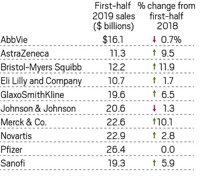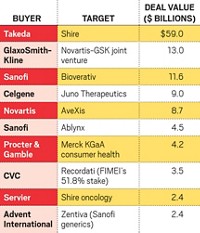Advertisement
Grab your lab coat. Let's get started
Welcome!
Welcome!
Create an account below to get 6 C&EN articles per month, receive newsletters and more - all free.
It seems this is your first time logging in online. Please enter the following information to continue.
As an ACS member you automatically get access to this site. All we need is few more details to create your reading experience.
Not you? Sign in with a different account.
Not you? Sign in with a different account.
ERROR 1
ERROR 1
ERROR 2
ERROR 2
ERROR 2
ERROR 2
ERROR 2
Password and Confirm password must match.
If you have an ACS member number, please enter it here so we can link this account to your membership. (optional)
ERROR 2
ACS values your privacy. By submitting your information, you are gaining access to C&EN and subscribing to our weekly newsletter. We use the information you provide to make your reading experience better, and we will never sell your data to third party members.
Business
Merck To Acquire Schering-Plough
The $41 billion deal is one of three big mergers reshaping the pharmaceutical industry
by Lisa M. Jarvis
March 16, 2009
| A version of this story appeared in
Volume 87, Issue 11
FOLLOWING RIVALS Pfizer and Roche down the acquisition trail, Merck & Co. has agreed to pay $41 billion for fellow New Jersey-based drug firm Schering-Plough. The deal, expected to close in the fourth quarter, will create a pharmaceutical behemoth that would have had sales of $46.9 billion last year.
The planned purchase is a major change of course for Merck, which long maintained that its own science-driven culture was sufficient to create strong sales growth. But earlier this year, Merck CEO Richard T. Clark told investors that, in the current challenging climate, the company could no longer rule out acquisitions of scale.
As Fred Hassan, Schering-Plough's CEO put it, the new company will have "a critical mass to absorb the bigger and bigger shocks" reverberating through the drug industry on a regular basis.
In acquiring Schering-Plough, Merck is building on a relationship that began in 2000 with a joint venture to develop cholesterol-lowering drugs. Blazing sales of the two resulting drugs, Vytorin and Zetia, helped each company to recover from setbacks in the early part of the decade. But growing questions over the drugs' efficacy have led to a steady decline in sales. With generic competition to other key drugs and an increasingly challenging operating environment, Merck finally decided to look beyond its own laboratories for growth.
The deal is the latest in what is shaping up to be a drug industry buying spree. Late last week, Roche and Genentech ended eight months of hostility and reached a friendly agreement under which Roche will acquire the 44% of Genentech it doesn't already own for $95.00 per share, or about $46.8 billion. Earlier this year, Pfizer agreed to fork over $68 billion for Wyeth.
Whereas the Pfizer-Wyeth deal is seen as a marriage of convenience, industry watchers are happier with the combination of Merck and Schering-Plough. BMO Capital Markets stock analyst Robert Hazlett calls Schering-Plough "a solid asset at a great price," adding that he considers the company's late-stage pipeline to be the best in the drug industry.
However, many believe the price tag is a little low. Rather than a straight acquisition, the deal is structured as a reverse merger, in which Schering-Plough will be the surviving company but be renamed Merck. It's the companies' way of trying to sidestep a clause in a pact between Schering-Plough and Johnson & Johnson for the arthritis drug Remicade: Should Schering-Plough change hands, J&J can acquire the rights to both Remicade, which had sales of over $2 billion last year, and another arthritis drug in late-stage development.
Despite "an elegant deal structure," Leerink Swann analyst Seamus Fernandez expects J&J to take some action, whether it's a counteroffer or a challenge to the reverse merger approach, to gain full control of the arthritis franchise. If Schering-Plough does jilt Merck at the altar, it will have to pay a $1.5 billion break-up fee.
Whether the deal goes through or not, Merck is offering up a strikingly similar rationale for the combination to that posited by Pfizer in its bid for Wyeth: to diversify its portfolio, bolster its position in emerging markets, and increase its ability to discover and develop biopharmaceuticals.
"One of our key strategic objectives is to have more stable, consistent top-line growth," Clark said in the conference call. After the combination, Merck says, no one product will account for more than 10% of sales—a claim also made by Pfizer in its acquisition of Wyeth. Clark noted that Schering-Plough's lead products have a lot of time left on the patent clock. Further, the addition of Schering-Plough's pipeline will double the number of drugs in Phase III trials at Merck to 18.
The deal also bolsters Merck's presence in biopharmaceuticals, an area the company has targeted for growth. Last year, Merck created a BioVentures unit dedicated to developing follow-on versions of currently marketed biotherapeutics (C&EN, Jan. 12, page 28). Schering-Plough will expand that effort through its Organon BioSciences unit, which it acquired from AkzoNobel in 2007 for $14 billion.
Of course, the companies also believe they can save money through consolidation. Both firms have existing cost-cutting programs—Merck initiated a $1 billion program late last year, while Schering-Plough is in the midst of a $1.5 billion savings plan—and intend to carve out an additional $3.5 billion in savings by 2011, in part by cutting 15% of their combined workforce of 106,000.








Join the conversation
Contact the reporter
Submit a Letter to the Editor for publication
Engage with us on Twitter